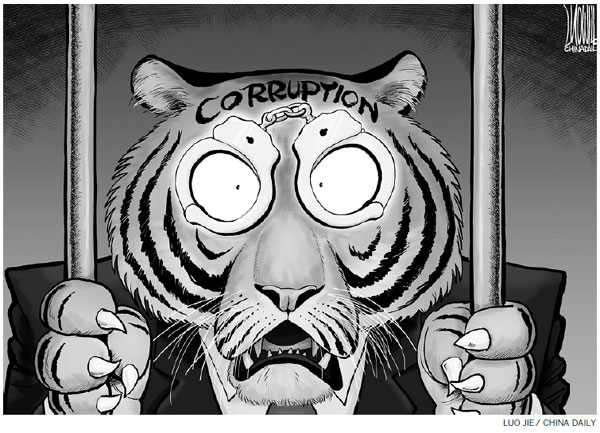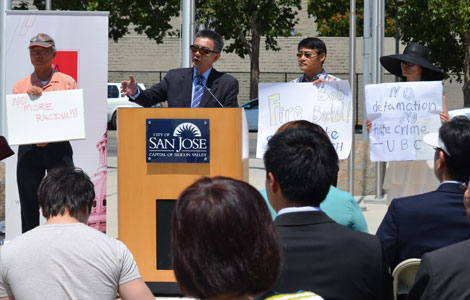Caging top 'tiger' invites call for deeper reform
Updated: 2014-07-31 06:58
(China Daily USA)
|
||||||||
Lay foundation for rule of law
The news that Zhou Yongkang, until recently one of the most powerful men in China, is to be investigated for suspected "serious disciplinary violations" is the clearest indication yet of the top leader Xi Jinping's determination to tackle corruption by rooting out the "tigers as well as flies".
Until he retired in 2012, Zhou was the top security chief and a member of the Politburo Standing Committee. He is the most senior Chinese official to be investigated since the "Gang of Four" were brought to justice in the early 1980s.
Last year, a rising political star Bo Xilai was put on trial and convicted of corruption. The Party has already said it is investigating several more officials suspected of corruption, including Jiang Jiemin, who was in charge of the State-owned Assets Supervision and Administration Commission until last September. Jiang was previously chairman of the State-owned China National Petroleum Corp where Zhou also worked. Last month, the Party said one of its most senior former military officers, Xu Caihou, was being court-martialed for corruption.
These arrests and investigations are a clear sign that the top leader Xi is serious about tackling corruption within the Party. He has repeatedly warned that corruption could threaten the Party's very survival. It is no coincidence that as Zhou's investigation was made public, the Party announced that the Fourth Plenary Session of the 18th Communist Party of China Central Committee will focus on promoting the rule of law.
The Chinese perception of the rule of law, however, is not the same as Western perceptions. The rule of law still operates under the overall authority of the CPC while in Western countries there is a separation between the executive and judicial branches.
The anti-corruption campaign and the downfall of Zhou should not hinder China's stability and economic development. To date there have been 30-plus cases involving senior Party officials with many more at local levels. But Xi is determined to enhance trust in the Party that has been eroded over the years due largely to local officials taking bribes for real estate development. Many top restaurants are suffering a loss in business as Party "bosses" are forced to cut back on entertainment. But the anti-corruption campaign is popular with ordinary citizens who are increasingly calling for greater protection under the rule of law.
A more stable and predictable economic environment with greater prominence for the rule of law should encourage more foreign investment. Western businessmen will hope that these latest developments will also herald a more open and transparent business climate in China in which corruption is greatly reduced if not exactly eradicated.
Fraser Cameron is director of the EU-Asia Centre.
No matter how high, no one is out of reach
The highest ranking officials investigated for corruption before Zhou Yongkang were deputy-national level officials, such as the vice-chairmen of the Standing Committee of the National People's Congress, the National Committee of the Chinese People's Political Consultative Conference, and the Central Military Commission. Zhou, who was a former member of the Standing Committee of the Political Bureau, is up till now the highest ranking official ever to be investigated for corruption.
China's new national leadership headed by President Xi Jinping has demonstrated zero tolerance toward corruption and absolute resolve to carry through the crackdown since the 18th Communist Party of China National Congress. The investigation of Zhou has shown their unbiased attitude toward all the officials irrespective of their rankings.
The disregarding of the titles of the "tigers", or corrupt officials holding important positions, is a test of how tough the top leaders will be against the rotten apples.
The central leadership is expected to carry out bold measures through deeper reforms to eradicate corruption.
Ren Jianming is director of the Clean Governance Research and Education Center at Beihang University.
Campaign has global importance
The news that Zhou Yongkang is now under investigation is of great importance not just for China, but also in a global context. The rest of the world listened with considerable interest to the announcement by the top leader Xi Jinping that he was making the fight against corruption a hallmark of his leadership.
That battle is important because it is a key ingredient in securing the dynamic development of the Chinese economy for the long haul - and hence the future aspirations of the Chinese people.
The historical record in quite a few countries and regions of the world indicates that when economies undergo transformational boom times, there is plenty of opportunity to engage in acts of corruption.
Smart countries put an end to those practices as soon as they can. They do so for two key reasons: First, corruption undermines the true growth potential of an economy; and second, it only benefits a small coterie of people who control the decision-making process for economic projects.
The historical record also indicates that one may hope that the problem is restricted to just a few bad apples, so to speak. But whether or not that is true can only be ascertained as part of applying the rule of law.
And that, in turn, means that everybody in society is held to the same standards. Given the egalitarian traditions of the Chinese revolution, achieving such equality before the law should be seen as being fully within the arc of historic achievements, rather than as something that militates against it.
Any Westerner who has witnessed discussions in China about the rule of law and moving to a country increasingly governed by contracts comes away fascinated about the excitement felt by many Chinese experts. Ultimately, a China where everybody is equal under the law represents a cultural innovation that is in the nation's true self-interest.
The Zhou Yongkang case, if all goes well, can be seen as the opening shot in China's campaign to clean house. The key to a successful fight against corruption- and the core indication of a truly enlightened political leadership - is that it will allow the anti-corruption campaign to go where the evidence leads it.
That may not be always pleasant, but is the key precondition for a thorough housecleaning and to root out, to the maximum extent possible, future efforts to betray the country and its people.
One final notion about cases in the Western world, such as the legal troubles that France's former president Nicolas Sarkozy presently finds himself in. More often than not, these cases are due not to acts of personal corruption.
Usually, legal cases are brought against such former leaders there because they channeled campaign contributions to their political parties. That doesn't make these diversionary financing strategies any less illegal, but they certainly don't have the stench of personal corruption.
In conclusion, any nation with great aspirations and great potential, such as China has, is well served by a leadership that makes the fight against corruption and for transparency a cornerstone issue of its term in office. The long-term benefits of such an approach, if it is fully executed, will be reaped by generations to come.
Stephan Richter is publisher and editor-in-chief of The Globalist.

(China Daily USA 07/31/2014 page12)

 Panda North American film festival opens for submissions
Panda North American film festival opens for submissions
 Lavender farm has right scent to lure Chinese tourists
Lavender farm has right scent to lure Chinese tourists
 Silicon Valley rally calls on Fox News to fire Beckel
Silicon Valley rally calls on Fox News to fire Beckel
 Talent competition
Talent competition
 Philadelphia Orchestra continues China ties
Philadelphia Orchestra continues China ties
 Chinese, US naval hospital ships conduct exchange
Chinese, US naval hospital ships conduct exchange
 High rent pressures NYC Asian eateries
High rent pressures NYC Asian eateries
 BYD's green bus in test ride
BYD's green bus in test ride
Most Viewed
Editor's Picks

|

|

|

|

|

|
Today's Top News
Microsoft responds to anti-monopoly probe
NYS to attract more Chinese tourists
Alibaba mulls Snapchat funding
Ex-Panbassadors enjoy home
Chinese antitrust agency probes Microsoft
Safety concerns Chinese communities in US
BYD's green bus in test ride
Top 'tiger' caged by graft probe
US Weekly

|

|






